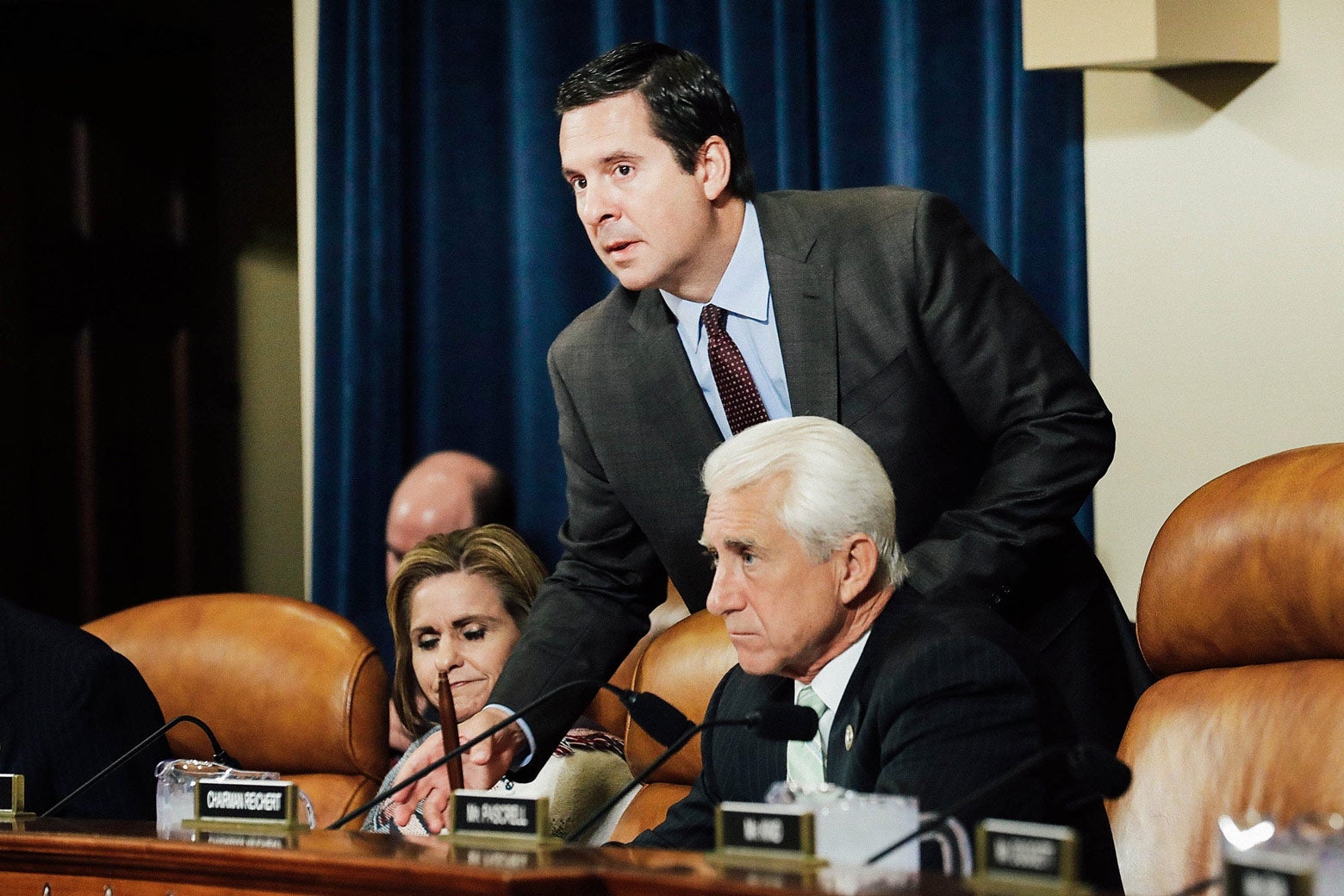Michael Cohen’s guilty plea to a single felony count of lying to Senate and House committees will not appreciably add to his criminal liability. As Ken White observed, the panoply of serious felonies to which Cohen previously pleaded guilty carry far harsher likely penalties than the worst Cohen could expect to face for this single new charge. In fact, Cohen’s new plea was actually very good news for Donald Trump’s former lawyer, in that it’s likely his overall sentence will be reduced in return for his cooperation with the office of special counsel Robert Mueller.
Yet Cohen’s new plea must have been quite chilling to others, including the president—whom the charging documents implicate in the secret pursuit of a Russian real estate scheme in the midst of the 2016 campaign—as well as a number of other individuals who may have been less than honest during their interviews before the Senate and House intelligence committee inquiries into Russia’s role in the campaign.
These potentially dishonest witnesses could be excused for having previously believed they could lie to Congress with a certain amount of impunity.
Making a material misstatement to congressional investigators, even in an unsworn interview, is a potential felony, as is stating such falsehoods to the FBI or other federal law enforcement agencies. Yet prosecutions for lying to Congress are rarely brought; a 2007 study found that there had been only six successful convictions for perjury or related charges with respect to Congress during the prior 60 years.
This is probably not because witnesses called before congressional hearings are unusually honest. Rather, prosecutors rarely investigate such charges absent a referral from Congress. Furthermore, potential defendants often are not pursued with particular vigor by prosecutors. Perhaps this is because the alleged liars are often members of the executive branch whom the Department of Justice, part of the same branch of the government, may be less than enthusiastic about pursuing.
The case of CIA Director Richard Helms actually proves the point. In 1977, Helms pleaded nolo contendere to misdemeanor charges of failing to testify “fully, completely, and accurately” before a Senate committee. Helms had lied about the agency’s role in subverting Chilean President Salvador Allende, who was overthrown by a military coup. The circumstances giving rise to even these relatively light charges (for which Helms served no jail time) were quite unusual. Helms was charged in the wake of Sen. Frank Church’s unusually searching post-Watergate inquiry into abuses by the nation’s intelligence agencies. A more typical case is that of then–Director of National Intelligence James Clapper, who faced no legal consequences for his admittedly inaccurate Senate testimony regarding the government’s warrantless gathering of email and other data from U.S. citizens.
Until very recently, lying before the House Intelligence Committee during its Russia investigation has seemed, even by generally lax congressional standards, likely to be nonconsequential. Far from considering the referral of even the most mendacious of witnesses for potential prosecution, the committee’s Republican majority has refused even to give Mueller transcripts of its interviews. The GOP majority thereby all but ensured that prosecutions for false statements simply could not be brought, at least in the absence of voluntary admissions like Cohen’s.
Yet that will soon change. Incoming Democratic House Intelligence Committee Chair Adam Schiff has made it clear that one of the first items on the new majority’s agenda next year will be to forward those transcripts to the special counsel. Those transcripts will likely be accompanied by expressions of concern regarding the veracity of the testimony of several witnesses, in light of facts that have recently come to light, including as a result of Mueller’s recently filed charging documents in the Cohen case and other cases.
The irony of this new situation is that, as Susan Hennessey has observed, outgoing House Intelligence Committee Chairman Devin Nunes, Rep. Mike Conaway (who purportedly led the Russia inquiry after Nunes’ quasi-recusal), lead interrogator Trey Gowdy, and the other GOP members of the committee may, wholly unintentionally, prove to have been devastatingly effective questioners in the service of future false-statement prosecutions.
This is because, as the House Intelligence Committee majority’s publicly released report indicates, the GOP appears to have all but openly encouraged its witnesses to deny any and all potential wrongdoing, regardless of the plausibility of their denials. Thus, the GOP members and their staffs appear to have been singularly uninterested in testing the veracity of witnesses’ testimony or even inquiring into elemental questions, such as whether Donald Trump Jr. called his father regarding his Trump Tower meeting with representatives of the Russian government, or whether Blackwater founder Erik Prince lied regarding yet another Trump Tower meeting, this one including Don Jr. and, among others, representatives of two Gulf states.*
As a result, some witnesses affiliated with Trump and his campaign may have been lulled into thinking they could lie with particular impunity. It is therefore possible, if not likely, that a fairly substantial number of witnesses, including possibly the president’s eldest son, will soon find themselves facing the unusual prospect of being criminally charged for lying before a House panel that all but welcomed their dishonesty.
And as Mueller’s prior felony charges for lying against individuals including Michael Flynn, George Papadopoulos, and Alex van der Zwaan have demonstrated, the threat of such criminal liability can often be just what it takes to induce liars to tell important truths to investigators.
*Correction, Dec. 1, 2018: This piece originally mischaracterized Erik Prince as an Amway heir. Prince’s sister, Education Secretary Betsy DeVos, is married to former Amway chairman Dick DeVos.
